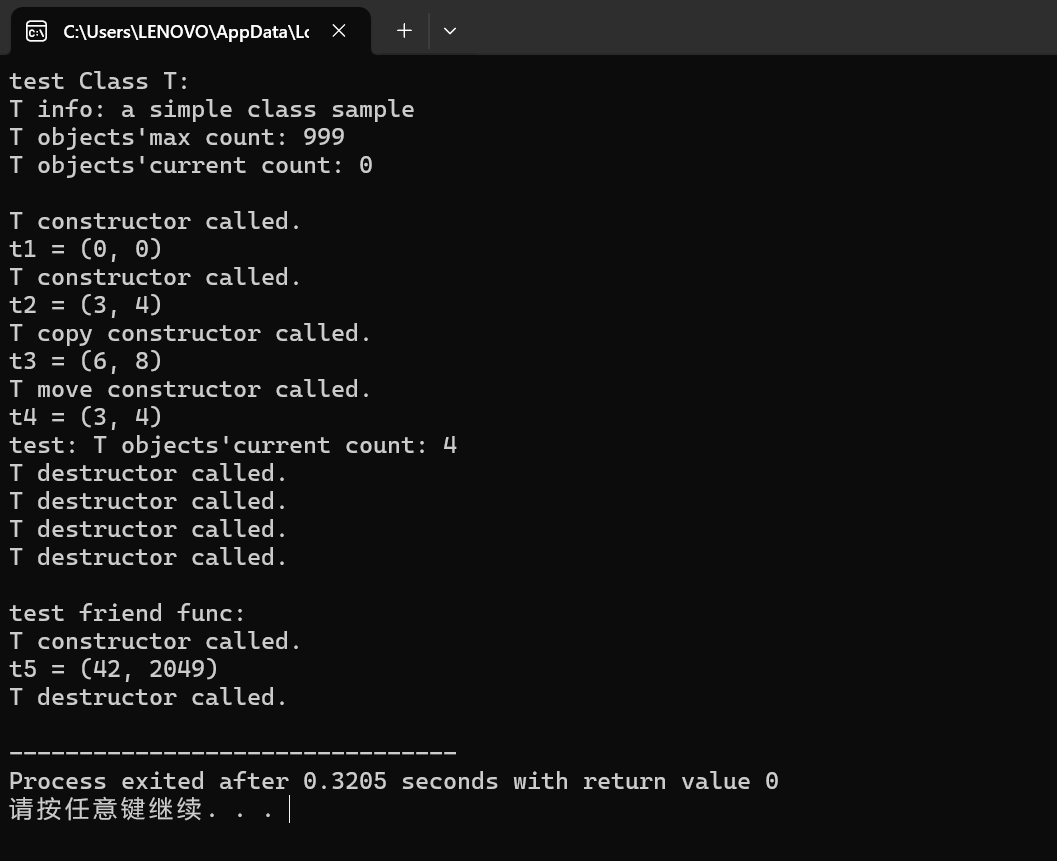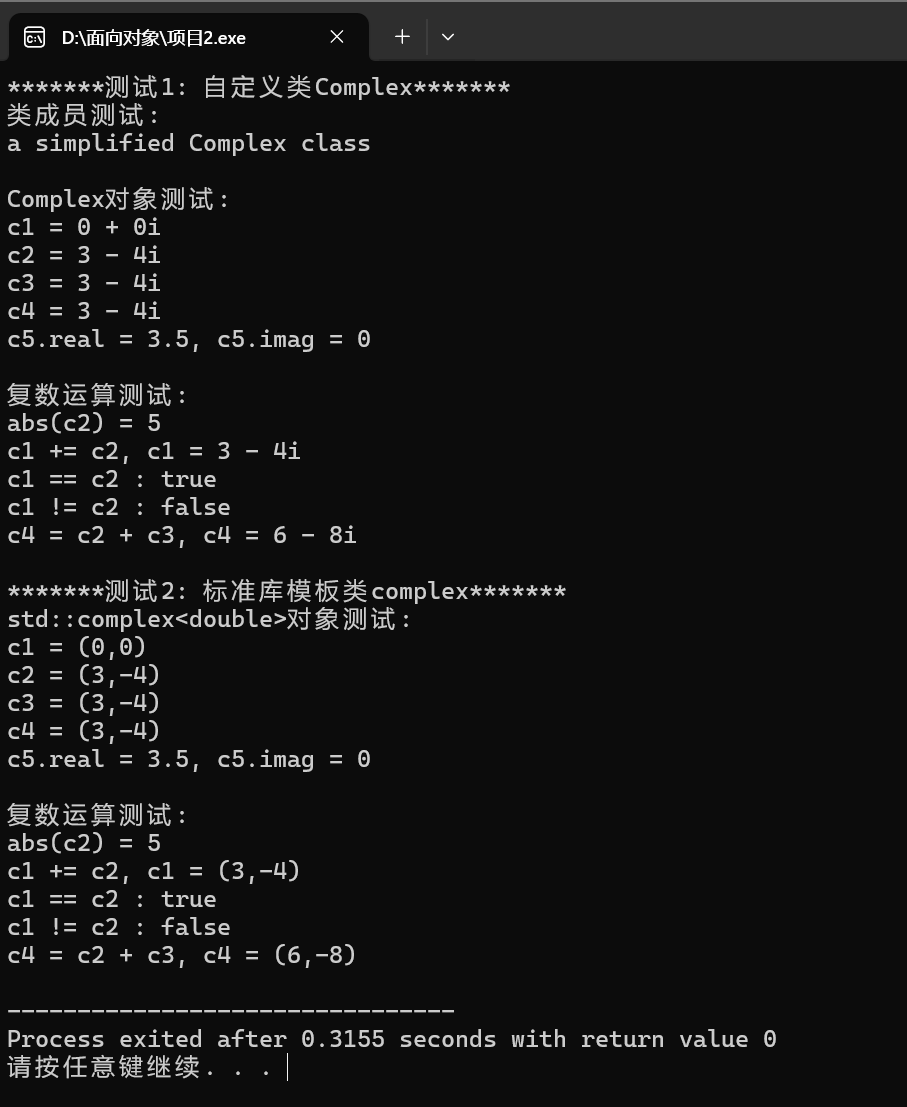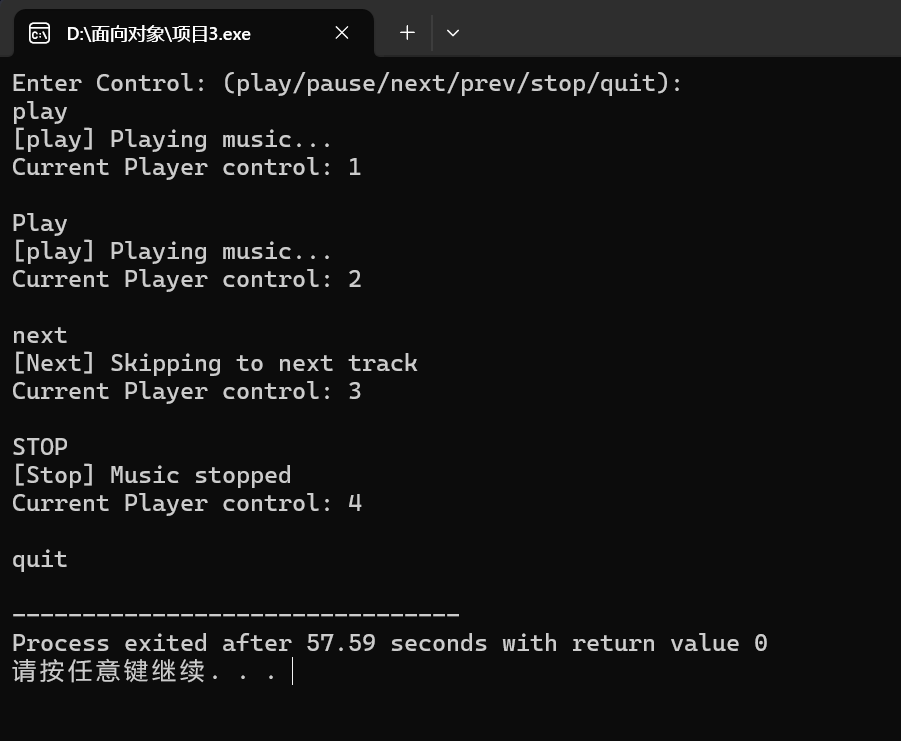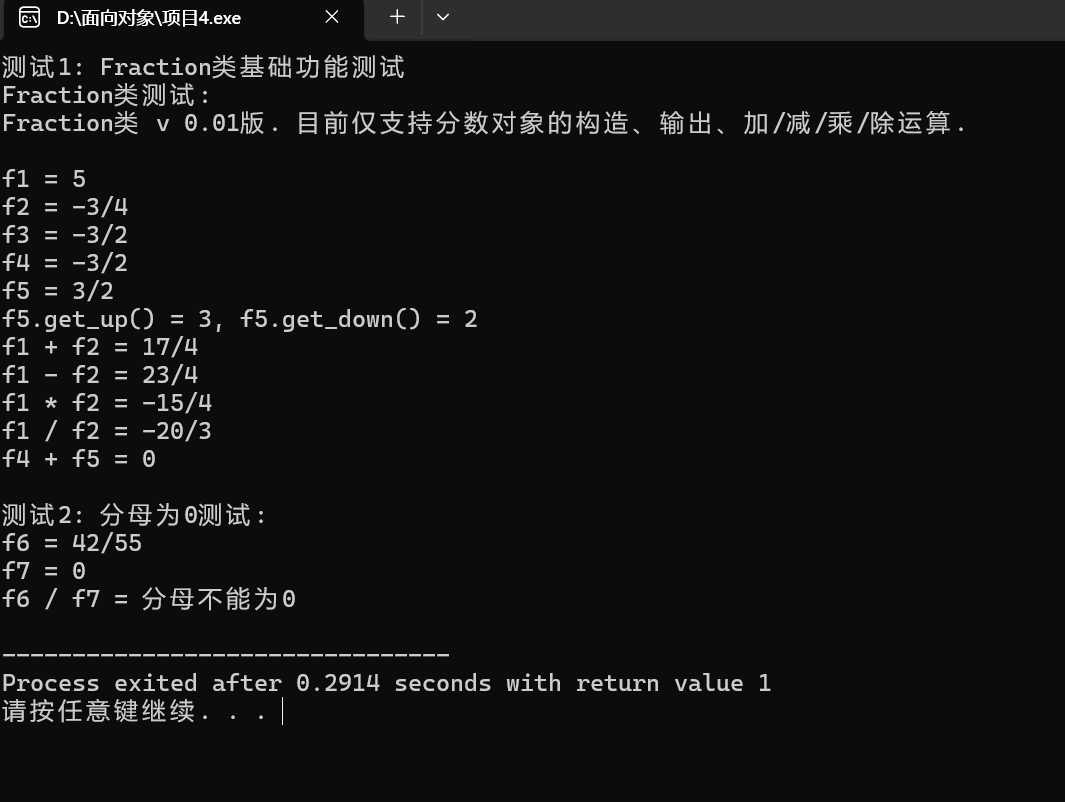Task1:
1.源代码:
#pragma once#include <string>// 类T: 声明 class T { // 对象属性、方法 public:T(int x = 0, int y = 0); // 普通构造函数T(const T &t); // 复制构造函数T(T &&t); // 移动构造函数~T(); // 析构函数void adjust(int ratio); // 按系数成倍调整数据void display() const; // 以(m1, m2)形式显示T类对象信息private:int m1, m2;// 类属性、方法 public:static int get_cnt(); // 显示当前T类对象总数public:static const std::string doc; // 类T的描述信息static const int max_cnt; // 类T对象上限private:static int cnt; // 当前T类对象数目// 类T友元函数声明friend void func(); };// 普通函数声明 void func();
#include "T.h" #include <iostream> #include <string>// 类T实现// static成员数据类外初始化 const std::string T::doc{"a simple class sample"}; const int T::max_cnt = 999; int T::cnt = 0;// 类方法 int T::get_cnt() {return cnt; }// 对象方法 T::T(int x, int y): m1{x}, m2{y} { ++cnt; std::cout << "T constructor called.\n"; } T::T(const T &t): m1{t.m1}, m2{t.m2} {++cnt;std::cout << "T copy constructor called.\n"; }T::T(T &&t): m1{t.m1}, m2{t.m2} {++cnt;std::cout << "T move constructor called.\n"; } T::~T() {--cnt;std::cout << "T destructor called.\n"; } void T::adjust(int ratio) {m1 *= ratio;m2 *= ratio; } void T::display() const {std::cout << "(" << m1 << ", " << m2 << ")" ; } // 普通函数实现 void func() {T t5(42);t5.m2 = 2049;std::cout << "t5 = "; t5.display(); std::cout << '\n'; }
#include "T.h" #include <iostream>void test_T();int main() {std::cout << "test Class T: \n";test_T();std::cout << "\ntest friend func: \n";func(); }void test_T() {using std::cout;using std::endl;cout << "T info: " << T::doc << endl;cout << "T objects'max count: " << T::max_cnt << endl;cout << "T objects'current count: " << T::get_cnt() << endl << endl;T t1;cout << "t1 = "; t1.display(); cout << endl;T t2(3, 4);cout << "t2 = "; t2.display(); cout << endl;T t3(t2);t3.adjust(2);cout << "t3 = "; t3.display(); cout << endl;T t4(std::move(t2));cout << "t4 = "; t4.display(); cout << endl;cout << "test: T objects'current count: " << T::get_cnt() << endl; }
2.运行截图:

3.问题回答

#pragma once #include <iostream> #include <cmath>class Complex { public:static const char* doc;Complex(double r=0.0,double i=0.0);Complex(const Complex& other);double get_real() const;double get_imag() const;Complex add(const Complex& other);friend void output(const Complex& c);friend double abs(const Complex& c);friend Complex add(const Complex& c1, const Complex& c2);friend bool is_equal(const Complex& c1, const Complex& c2);friend bool is_not_equal(const Complex& c1, const Complex& c2);private:double real; double imag; };
#include "Complex.h" #include <cmath> const char* Complex::doc = "a simplified Complex class"; Complex::Complex(double r, double i) : real(r), imag(i) {} Complex::Complex(const Complex& other) : real(other.real), imag(other.imag) {} double Complex::get_real() const {return real; } double Complex::get_imag() const {return imag; } Complex Complex::add(const Complex& other) {real += other.real;imag += other.imag;return *this; } void output(const Complex& c) {std::cout << c.real;if (c.imag >= 0) {std::cout << " + " << c.imag << "i";} else {std::cout << " - " << -c.imag << "i";} } double abs(const Complex& c) {return std::sqrt(c.real * c.real + c.imag * c.imag); } Complex add(const Complex& a, const Complex& b) {return Complex(a.real + b.real, a.imag + b.imag); } bool is_equal(const Complex& a, const Complex& b) {return a.real == b.real && a.imag == b.imag; }bool is_not_equal(const Complex& a, const Complex& b) {return a.real != b.real || a.imag != b.imag; }
// 待补足头文件 // xxx #include"Complex.h" #include <iostream> #include <iomanip> #include <complex>void test_Complex(); void test_std_complex();int main() {std::cout << "*******测试1: 自定义类Complex*******\n";test_Complex();std::cout << "\n*******测试2: 标准库模板类complex*******\n";test_std_complex(); }void test_Complex() {using std::cout;using std::endl;using std::boolalpha;cout << "类成员测试: " << endl;cout << Complex::doc << endl << endl;cout << "Complex对象测试: " << endl;Complex c1;Complex c2(3, -4);Complex c3(c2);Complex c4 = c2;const Complex c5(3.5);cout << "c1 = "; output(c1); cout << endl;cout << "c2 = "; output(c2); cout << endl;cout << "c3 = "; output(c3); cout << endl;cout << "c4 = "; output(c4); cout << endl;cout << "c5.real = " << c5.get_real() << ", c5.imag = " << c5.get_imag() << endl << endl;cout << "复数运算测试: " << endl;cout << "abs(c2) = " << abs(c2) << endl;c1.add(c2);cout << "c1 += c2, c1 = "; output(c1); cout << endl;cout << boolalpha;cout << "c1 == c2 : " << is_equal(c1, c2) << endl;cout << "c1 != c2 : " << is_not_equal(c1, c2) << endl;c4 = add(c2, c3);cout << "c4 = c2 + c3, c4 = "; output(c4); cout << endl; }void test_std_complex() {using std::cout;using std::endl;using std::boolalpha;cout << "std::complex<double>对象测试: " << endl;std::complex<double> c1;std::complex<double> c2(3, -4);std::complex<double> c3(c2);std::complex<double> c4 = c2;const std::complex<double> c5(3.5);cout << "c1 = " << c1 << endl;cout << "c2 = " << c2 << endl;cout << "c3 = " << c3 << endl;cout << "c4 = " << c4 << endl;cout << "c5.real = " << c5.real() << ", c5.imag = " << c5.imag() << endl << endl;cout << "复数运算测试: " << endl;cout << "abs(c2) = " << abs(c2) << endl;c1 += c2;cout << "c1 += c2, c1 = " << c1 << endl;cout << boolalpha;cout << "c1 == c2 : " << (c1 == c2)<< endl;cout << "c1 != c2 : " << (c1 != c2) << endl;c4 = c2 + c3;cout << "c4 = c2 + c3, c4 = " << c4 << endl; }
2.运行截图:

3.问题回答:
问题1:比较自定义类 Complex 和标准库模板类 complex 的用法,在使用形式上,哪一种更简洁?函数和运算内在有关联吗?
答:标准库模板类complex更简洁,有关联。
问题2:2-1:自定义 Complex 中, output/abs/add/ 等均设为友元,它们真的需要访问私有数据吗?(回答“是/否”并给出理由)2-2:标准库 std::complex 是否把 abs 设为友元?(查阅 cppreference后回答)2-3:什么时候才考虑使用 friend?总结你的思考。
2-1 答:是,因为自定义Complex类的核心数据被声明为私有成员,而这些友元函数的功能必须依赖这些私有数据才能实现。
2-2 答:否,因为abs通过调用两个public接口就可以获取所需数据,不需要依赖友元机制。
2-3 答:由于friend的核心作用是突破类的封装边界,因此要在避免过度破坏封装性的条件下使用,例如非成员函数需要访问内部数据等情况。
问题3:如果构造对象时禁用=形式,即遇到 Complex c4 = c2; 编译报错,类Complex的设计应如何调整?
答:将拷贝函数声明为explicit,禁止编译器的拷贝初始化。
Task3:
#pragma once #include <string>enum class ControlType {Play, Pause, Next, Prev, Stop, Unknown};class PlayerControl { public:PlayerControl();ControlType parse(const std::string& control_str); // 实现std::string --> ControlType转换void execute(ControlType cmd) const; // 执行控制操作(以打印输出模拟) static int get_cnt();private:static int total_cnt; };
#include "PlayerControl.h" #include <iostream> #include <algorithm> int PlayerControl::total_cnt = 0;PlayerControl::PlayerControl() {}// 待补足 // 1. 将输入字符串转为小写,实现大小写不敏感 // 2. 匹配"play"/"pause"/"next"/"prev"/"stop"并返回对应枚举 // 3. 未匹配的字符串返回ControlType::Unknown // 4. 每次成功调用parse时递增total_cnt ControlType PlayerControl::parse(const std::string& control_str) {std::string lower_str = control_str;std::transform(lower_str.begin(), lower_str.end(), lower_str.begin(), ::tolower);if (lower_str == "play") {total_cnt++;return ControlType::Play;} else if (lower_str == "pause") {total_cnt++;return ControlType::Pause;} else if (lower_str == "next") {total_cnt++;return ControlType::Next;} else if (lower_str == "prev") {total_cnt++;return ControlType::Prev;} else if (lower_str == "stop") {total_cnt++;return ControlType::Stop;} else {return ControlType::Unknown;}// xxx }void PlayerControl::execute(ControlType cmd) const {switch (cmd) {case ControlType::Play: std::cout << "[play] Playing music...\n"; break;case ControlType::Pause: std::cout << "[Pause] Music paused\n"; break;case ControlType::Next: std::cout << "[Next] Skipping to next track\n"; break;case ControlType::Prev: std::cout << "[Prev] Back to previous track\n"; break;case ControlType::Stop: std::cout << "[Stop] Music stopped\n"; break;default: std::cout << "[Error] unknown control\n"; break;} }int PlayerControl::get_cnt() {return total_cnt; }
#include "PlayerControl.h" #include <iostream>void test() {PlayerControl controller;std::string control_str;std::cout << "Enter Control: (play/pause/next/prev/stop/quit):\n";while(std::cin >> control_str) {if(control_str == "quit")break;ControlType cmd = controller.parse(control_str);controller.execute(cmd);std::cout << "Current Player control: " << PlayerControl::get_cnt() << "\n\n";} }int main() {test(); }
2.运行截图:

Task4:
1.源代码:
#pragma once #include <string>class Fraction { public:static const std::string doc;Fraction(int num = 0, int den = 1);Fraction(const Fraction& other);int get_up() const;int get_down() const;Fraction negative() const;void output() const;static Fraction add(const Fraction& f1, const Fraction& f2);static Fraction sub(const Fraction& f1, const Fraction& f2);static Fraction mul(const Fraction& f1, const Fraction& f2);static Fraction div(const Fraction& f1, const Fraction& f2); private:int up;int down;int gcd(int a, int b) const;void simplify(); };
#include "Fraction.h"
#include <iostream>
#include <cmath>
const std::string Fraction::doc = "Fraction类 v 0.01版. 目前仅支持分数对象的构造、输出、加/减/乘/除运算.";
Fraction::Fraction(int num, int den) : up(num), down(den) {
simplify();
}
Fraction::Fraction(const Fraction& other) : up(other.up), down(other.down) {}
int Fraction::get_up() const {
return up;
}
int Fraction::get_down() const {
return down;
}
Fraction Fraction::negative() const {
return Fraction(-up, down);
}
void Fraction::output() const {
if (down == 1) {
std::cout << up;
} else {
std::cout << up << "/" << down;
}
}
Fraction Fraction::add(const Fraction& f1, const Fraction& f2) {
int new_up = f1.up * f2.down + f2.up * f1.down;
int new_down = f1.down * f2.down;
return Fraction(new_up, new_down);
}
Fraction Fraction::sub(const Fraction& f1, const Fraction& f2) {
return add(f1, f2.negative());
}
Fraction Fraction::mul(const Fraction& f1, const Fraction& f2) {
return Fraction(f1.up * f2.up, f1.down * f2.down);
}
Fraction Fraction::div(const Fraction& f1, const Fraction& f2) {
if (f2.up == 0) {
std::cerr << "分母不能为0" << std::endl;
exit(1);
}
return mul(f1, Fraction(f2.down, f2.up));
}
int Fraction::gcd(int a, int b) const {
a = abs(a);
b = abs(b);
while (b != 0) {
int temp = b;
b = a % b;
a = temp;
}
return a;
}
void Fraction::simplify() {
if (up == 0) {
down = 1;
return;
}
int d = gcd(up, down);
up /= d;
down /= d;
if (down < 0) {
up = -up;
down = -down;
}
}
#include <iostream>void test1() {using std::cout;using std::endl;cout << "Fraction类测试: " << endl;cout << Fraction::doc << endl << endl;Fraction f1(5);Fraction f2(3, -4), f3(-18, 12);Fraction f4 = f3;cout << "f1 = ";f1.output(); cout << endl;cout << "f2 = ";f2.output();cout << endl;cout << "f3 = ";f3.output();cout << endl;cout << "f4 = ";f4.output();cout << endl;const Fraction f5(f4.negative());cout << "f5 = ";f5.output();cout << endl;cout << "f5.get_up() = " << f5.get_up()<< ", f5.get_down() = " << f5.get_down() << endl;cout << "f1 + f2 = ";Fraction result_add = Fraction::add(f1, f2);result_add.output();cout << endl;cout << "f1 - f2 = ";Fraction result_sub = Fraction::sub(f1, f2);result_sub.output();cout << endl;cout << "f1 * f2 = ";Fraction result_mul = Fraction::mul(f1, f2);result_mul.output();cout << endl;cout << "f1 / f2 = ";Fraction result_div = Fraction::div(f1, f2);result_div.output();cout << endl;cout << "f4 + f5 = ";Fraction result_add2 = Fraction::add(f4, f5);result_add2.output();cout << endl; }void test2() {using std::cout;using std::endl;Fraction f6(42, 55), f7(0, 3);cout << "f6 = ";f6.output();cout << endl;cout << "f7 = ";f7.output();cout << endl;cout << "f6 / f7 = ";Fraction result_div2 = Fraction::div(f6, f7);result_div2.output();cout << endl; }int main() {std::cout << "测试1: Fraction类基础功能测试\n";test1();std::cout << "\n测试2: 分母为0测试: \n";test2();return 0; }
2.运行截图:
3.问题回答:
问题1:分数的输出和计算, output/add/sub/mul/div ,你选择的是哪一种设计方案?(友元/自由函数/命名空间+自由函数/类+static)你的决策理由?如友元方案的优缺点、静态成员函数方案的适用场景、命名空间方案的考虑因素等。
答:我选择的设计方案是类 + static 成员函数,因为“类 + static 成员函数” 方案既能保证封装性(无需友元),又能明确操作与类的关联。
